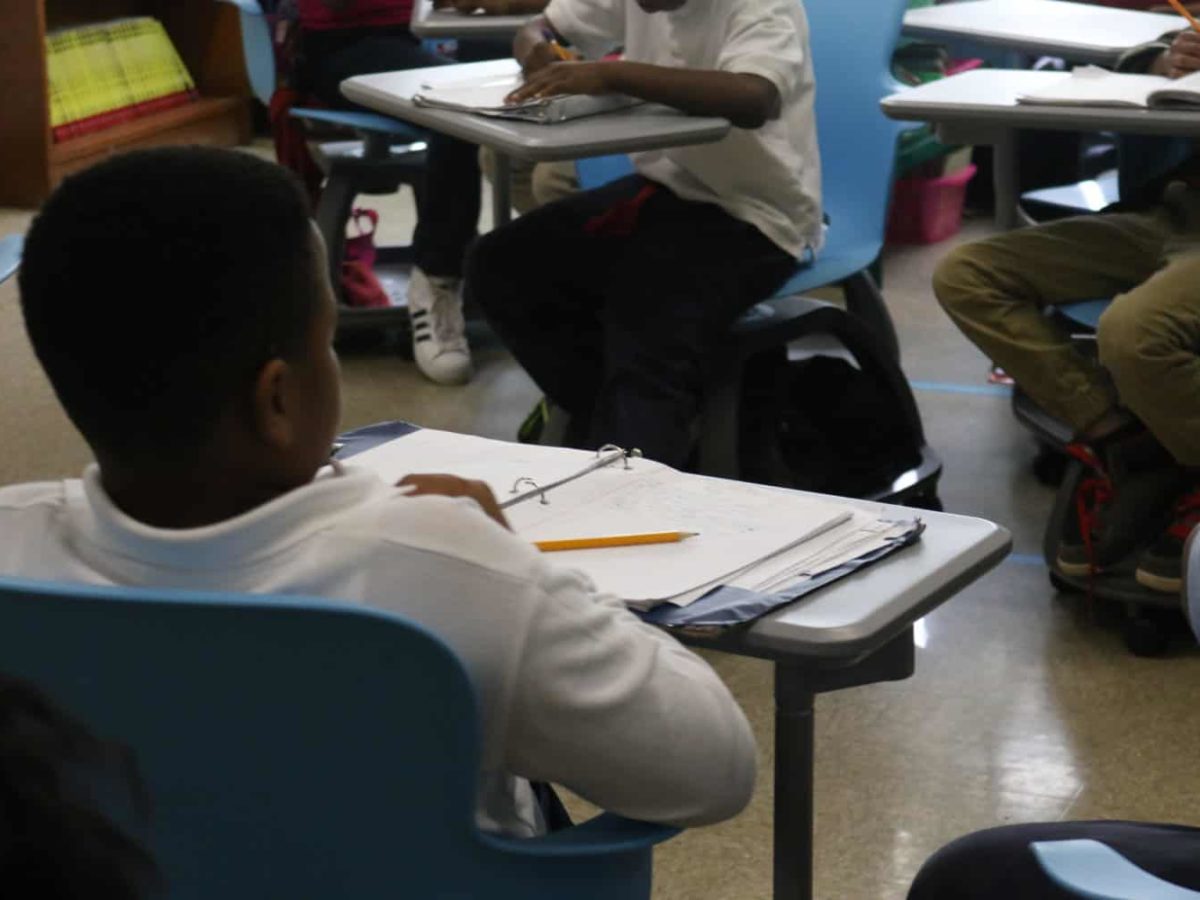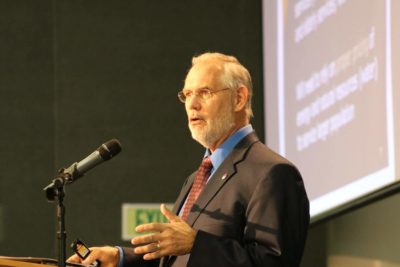

Twice this semester, I tagged along with a delegation of students of the UNC School of Media and Journalism on visits to congressional offices, technology companies, and news organizations in the nation’s capital. As we entered The Washington Post newsroom, our hosts gently asked that we not take iPhone pictures of the giant electronic scoreboard hanging from the ceiling.
It seemed a sign of the times that The Washington Post, a titan in the ink-on-paper press of the 20th century, now also keeps track of which articles, published on its website and other digital platforms, are attracting readers up to the minute. Since Jeff Bezos, the Amazon founder now worth $100 billion, bought the news organization for $250 million four years ago, the Post has had a resurgence in producing must-read journalism.
The so-called “Trump effect’’ has led to significant audience gains for The Post, The New York Times, and CNN. Despite President Trump’s slandering of these organizations as dispensers of “fake news,” his break-the-norms presidency has stirred a renewed appreciation for high-quality reporting and commentary.
And yet, in states and communities across the nation, as well as North Carolina, newspapers continue to decline in circulation, advertising, and news-gathering capacity. At the same time, Americans who go online on hand-held devices or laptops encounter a daunting array of blogs, tweets, websites, Facebook posts, a mixture of the professional and the amateurish, of the reliable and the unverified. At a recent appearance on the Chapel Hill campus, Mike Allen, a Washington columnist who is a co-founder of the new media company Axios.com, neatly summed up the situation when he told students that there is “so much information out there and people don’t know what to trust.”
I have offered this synopsis of the media maelstrom, amid the political polarization of our era, as context for reflecting on the work of EducationNC, as we soon complete the third year of publishing EdNC.org. Led by the indefatigable Mebane Rash, president and editor-in-chief who believes deeply in education as a force for the common good in North Carolina, EdNC has far exceeded the expectations of my colleague Gerry Hancock and I when we co-founded the nonprofit news organization in mid-2014.
EdNC has grown from a staff of three to nine, augmented by a network of freelance writers, educators, and project consultants. That growth has been fueled by funding from an array of foundations, corporations, and individuals, attracted by the need for an independent, nonpartisan source of news, analysis, and commentary centered on the education of North Carolina’s young people.
The efforts are being recognized by the larger journalism community. EducationNC received a News Integrity Initiative grant, a project of the Foundation for the CUNY Graduate School of Journalism, to develop ways to engage audiences through technology. The Education Writers Association selected reporter Liz Bell as a New to the Beat fellow. And most recently, the Center for Cooperative Media awarded EducationNC a collaborative grant to examine restart schools in partnership with WRAL.
Along the way, EdNC has absorbed the venerable North Carolina Center for Public Policy Research, which provides a base for exploring issues beyond the day-to-day work of running school systems, teaching young people, and deliberating legislation. Through Reach NC Voices, our organization is building the capacity to connect teachers, parents, and interested citizens, to the public policy discussions in their communities and in the halls of state government. For more about EdNC’s work, you can read Mebane’s recent “heartfelt Thanksgiving’’ essay and the 2016-17 annual report.
What I would add are a few thoughts about challenges faced and lessons learned. Even as a relatively small state-focused nonprofit — certainly not in the same league as the mighty, muscular Washington Post — EdNC has had to navigate through media and political turbulence.
We began publishing in January 2015 with these foundational precepts: EdNC would cover the state’s education news and the actions of its policymakers. EdNC would position itself as nonpartisan. At the same time, EdNC would serve as a forum for debate. And EdNC would give voice to voices not often heard through the media.
In an online world in which facts, pseudo-facts, opinions, and falsehoods pour out in similar visuals, we learned that we had to build trust with readers by clarifying the types of articles we publish. Over time, we have strived to label articles for what they are: straight “news” coverage, “perspectives’’ that provide commentary and points of view, “press releases’’ from government and education organizations, sponsored content identified with an organization’s name, and “editor’s picks’’ of news and commentary from across North Carolina and the nation. For more on the challenge of labeling, the Duke Reporters’ Lab offers this analysis.
Early on, we decided that EdNC would not write classic newspaper-type editorials. And EdNC would not be an advocacy organization. That is legitimate work for others to do. Still, rigidly neutral news coverage is insufficient to communicate the complex issues of education and related public policy.
EdNC is not values-less; it cares about how issues play out. EdNC certainly publishes articles written from a point of view, including my Friday with Ferrel columns. It also publishes commentaries that nettle some of our friends. Our working premise is that it serves North Carolina’s democracy to have a common-ground place for examining and debating issues, big and small.
At the outset, of course, we faced the basic challenge of building an audience. It is not automatic today, when people can construct their own news diet. With the advice of Nation Hahn and Tom Rabon at the New Kind agency, we became acquainted with techniques for reaching out to readers. Subsequently, Nation joined the EdNC staff and now guides Reach NC Voices. Our organization now has the capacity to reach every teacher in North Carolina, along with school administrators, state legislators, executive branch officials, business executives, and the ecosystem of education-related organizations.
In thinking about how far EdNC has come – and we continue to learn — I turned back to James W. Carey, and his collection of essays, Communication as Culture. Carey, who died a decade ago after a distinguished academic career at the University of Illinois and Columbia University, wrote an especially memorable essay on the societal transformations brought about by the telegraph that ring out today as we confront the transformations brought about by the internet.
In his writings, Carey constructed a simple yet profound insight: communication is both “a structure of human action’’ and a “structuring set of human relations.” The lesson for journalists in a democracy is that the act of communication is essential to forming a community, and that journalism in turn serves the community it has fostered.
At EdNC, we will soon begin our fourth year with an abiding commitment to covering news and providing a forum that builds a stronger North Carolina community — and that in turn enhances the life-long prospects of all Tar Heel young people.


